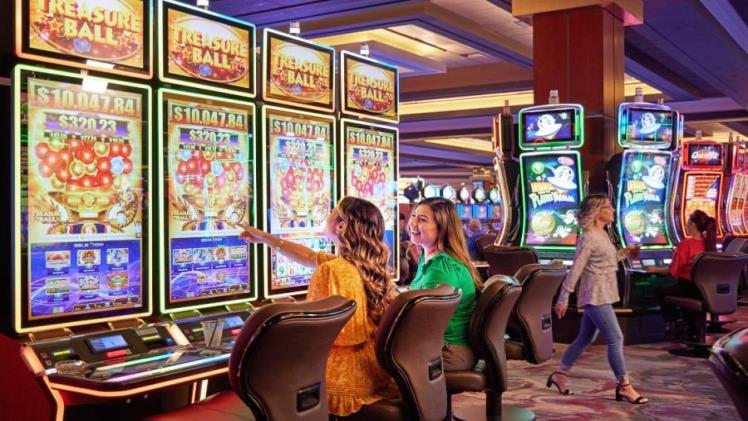Slot machines are among the most iconic elements of any casino—online or land-based. Their flashing lights, catchy sounds, and promise of massive jackpots draw millions of players every year. But behind the spinning reels lies a complex system of technology and mathematics that many players don’t fully understand.
Contrary to popular belief, slot machines aren’t “due to hit” or influenced by lucky charms. They operate on carefully programmed algorithms designed to be random, fair, and profitable for the casino. Understanding how slots truly work can help you play smarter and avoid common misconceptions.
Let’s break it down.
Contents
What Is a Slot Machine?
A slot machine is a gambling device where players place a wager and spin reels to match symbols along paylines. If certain symbol combinations appear, the player wins a payout. Slots can be mechanical, video-based, or fully digital on online platforms.
They come in various themes, styles, and gameplay types—ranging from simple 3-reel classics to complex 5-reel video slots with bonus rounds, wild symbols, and free spins.
The Random Number Generator (RNG)
At the heart of every slot machine is a Random Number Generator (RNG). This computer algorithm continuously cycles through thousands of number combinations every second—even when the machine isn’t being played. The moment you press the spin button or pull the lever, the RNG selects a random number that determines where the reels stop.
Because the RNG is always active, each spin is independent and unpredictable. That means:
- No spin is influenced by the previous one.
- The machine doesn’t know if you’re winning or losing.
- There’s no way to “time” the spin for a better result.
This is why theories like “the machine is due to pay out” or “it’s hot right now” are myths. Slots have no memory, and each spin has the same odds, regardless of past outcomes.
Return to Player (RTP) and House Edge
Every slot machine has a built-in Return to Player (RTP) percentage. This number represents how much of the money wagered on the machine will be paid back to players over time.
For example:
- A slot with an RTP of 96% means that, on average, the machine pays out $96 for every $100 wagered.
However, this is a long-term average over millions of spins. In a short session, results can vary wildly—some players win big, others lose quickly.
The remaining percentage—4% in the example above—is the house edge, which is how the casino makes money. Unlike table games where the house edge can be lowered through skill or strategy, slot machines offer no influenceable outcomes once you press spin.
Volatility and Payout Patterns
Not all slot machines behave the same way. Some pay out frequently with smaller wins, while others have fewer wins but higher jackpots. This is determined by a machine’s volatility or variance.
- Low volatility: More frequent wins, lower payouts. Great for longer playtime and smaller bankrolls.
- High volatility: Fewer wins, bigger potential jackpots. Best for risk-tolerant players looking for large payouts.
Understanding volatility helps players choose a game that matches their goals. If you enjoy small, consistent wins, a low-volatility game will likely feel more rewarding. If you’re chasing life-changing jackpots, high-volatility slots are the ones to play—but with caution.
Bonus Features and Payout Enhancers
Modern slot machines include numerous features designed to add excitement and keep players engaged. These include:
- Wild symbols: Replace other symbols to help form winning combinations.
- Scatter symbols: Trigger free spins or bonus games regardless of paylines.
- Multipliers: Increase the value of your win by a certain factor.
- Progressive jackpots: Grow over time and can reach massive amounts, often triggered randomly or through specific conditions.
While these features add variety and excitement, they also slightly reduce the base game RTP, as the potential for massive rewards is built into the payout structure.
Myths and Misconceptions
Slot machines are surrounded by myths. Let’s debunk a few of the most common:
- “The machine is due for a win.”
False. RNG ensures every spin is random and not influenced by previous outcomes.
- “Playing maximum bet increases your odds.”
Sometimes partially true. Some machines require max bet to unlock full jackpots or certain features, but it doesn’t increase the odds of winning a spin.
- “Casinos tighten machines at night.”
Also false. Licensed casinos cannot alter machines on demand. Game payouts are regulated and pre-set.
- “Stopping the reels faster helps you win.”
No. The outcome is already decided the moment you press spin. Stopping the reels early only affects animation Xổ số 78win.
Tips for Smarter Slot Play
While there’s no guaranteed way to win, you can still make informed decisions:
- Check the RTP. Choose games with higher RTPs (ideally above 95%).
- Understand volatility. Pick a game that matches your risk tolerance.
- Set a budget. Only gamble what you can afford to lose.
- Take breaks. Avoid extended play sessions that lead to fatigue or impulse spending.
- Use bonuses wisely. Free spins or match bonuses can extend playtime, but read terms carefully.
Final Thoughts
Slot machines are designed to be fun, fast, and unpredictable. While they offer a chance at big wins, they’re ultimately 78win of chance governed by math and randomization—not luck, timing, or “feel.”
Understanding how slot machines really work—especially the role of RNG, RTP, and volatility—can help you manage expectations, enjoy the experience, and avoid falling for common traps.
So next time you press that spin button, remember: you’re not playing against a machine with memory or emotion. You’re participating in a game of pure chance—and the real win is playing smart.
